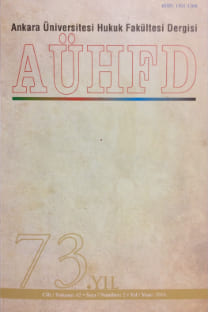AVRUPA TOPLULUĞU HUKUKUNDA İPTAL DAVASI VE ÖZEL KİŞİLERİN DAVACI OLABİLME KOŞULLARI: TOPLULUK İÇTİHADI IŞIĞINDA BİR İNCELEME
Avrupa Topluluğunun yargı organlarının münhasır yetkisine giren davalar arasında yer alan iptal davası yoluyla hem Topluluk kurumlarının bağlayıcı tasarruflarının hukuka uygunluk denetimi gerçekleştirilmekte, hem de Topluluk hukukuna hakim olan ilkelerin Divan ve İlk Derece Mahkemesi tarafından yorumlanma ve geliştirilmesi imkanı doğmaktadır. Sınırlı yetki ilkesinin hakim olduğu Toplulukta, bu yetkinin sınırlarının ve çerçevesinin çizilmesi ve denetlenmesinde, dolayısıyla bir yandan üye devletlerle Topluluk, öte yandan da Topluluk kurumları arasındaki dengenin korunmasında iptal davası önemli bir rol oynamaktadır. Bundan başka, davanın ikinci bir temel fonksiyonu, bireysel hakların Topluluk düzeyinde etkili biçimde korunmasında oynadığı rolde kendisini göstermektedir. Bu çalışmada, konu ile ilgili Topluluk yargı organlarının içtihadı, son derece sınırlayıcı bir koşullar içeren özel kişilerin davacı olabilme koşulları perspektifinden incelenmektedir. Bu alandaki içtihadın bugüne kadarki gelişim çizgisi ortaya konarak, bundan sonra izleyebileceği yol eleştirel olarak ele alınmakta ve kurucu antlaşma değişikliğinin bu alanda gelişme kaydedilmesi bakımdan zorunlu hale geldiği ortaya konmaktadır
Anahtar Kelimeler:
Avrupa Topluluğu Hukuku, Avrupa Toplulukları Adalet Divanı, AT’de Hukuka Uygunluk Denetimi, AT Hukukunda İptal Davası, Davacı Olma Koşulları
-
As a type of proceeding which is within the exclusive jurisdiction of the European Community courts, the action for annulment performs a dual function. Through this procedure the judicial review of Community acts is performed and the Community courts have the opportunity to construe and develop the general principles of Community law. Since the Community is founded on the principle of limited and attributed powers, the action for annulment has a significant role in delimiting and controlling the powers of the Community; by striking the institutional balance amongst the Community institutions on the one hand, and regulating the relations between those institutions and the Member States, on the other. Moreover, the action for annulment has another basic function, that is reflected in its role in the effective protection of individuals’ rights at the Community level. This study focuses on the case-law of the Community courts in the field of action for annulment, with an emphasis on the rather strict conditions of private litigants’ locus standi. The case-law is analysed with a view to make a prediction on its future line of development and as a conclusion it is argued that the treaty revision might have become the only way forward in this field
Keywords:
European Community Law, European Court of Justice, Judicial Review in the EC, Action for Annulment in EC Law, Locus Standi,
- ISSN: 1301-1308
- Yayın Aralığı: Yılda 4 Sayı
- Başlangıç: 1943
- Yayıncı: Ankara Üniversitesi Hukuk Fakültesi
Sayıdaki Diğer Makaleler
İŞ HUKUKUNDA MUTLAK EMREDİCİ HÜKÜMLERİN YERİ
ROMA HUKUKU’NDA VE KARŞILAŞTIRMALI HUKUKTA ALACAĞIN TEMLİKİ
CEZA MUHAKEMESİ KANUNUNDA UZLAŞTIRMA
TÜRK VERGİ HUKUKUNDA VERGİ SORUMLUSU, SORUMLULUK HALLERİ VE TÜRLERİNİN İNCELENMESİ
ANAYASA MAHKEMELERİ ÖNEMLİ MİDİR? Orta Avrupa’da Anayasa Yargısı ve Demokrasinin Pekişmesi
YENİ İL ÖZEL İDARESİ KANUNUNA GÖRE İL GENEL MECLİSİ VE ENCÜMENİ KARARLARI ÜZERİNDE VESAYET DENETİMİ
TÜRKİYE’DE FESHE KARŞI KORUMA HUKUKU REFORMUNUN SOSYAL HUKUK VE İSTİHDAM ÜZERİNE ETKİLERİ
MODERN DEVLET’İN BEDEN İDEOLOJİSİ ÜZERİNE KISA BİR DENEME
TÜKETİM MALLARININ SATIMINDAKİ GARANTİLERE İLİŞKİN AB YÖNERGESİ ve ÜLKEMİZDEKİ YASAL DÜZENLEME
